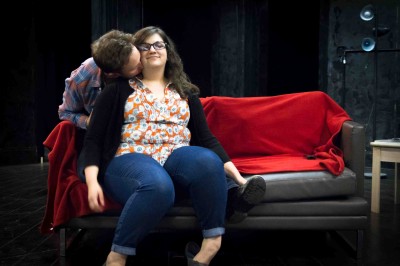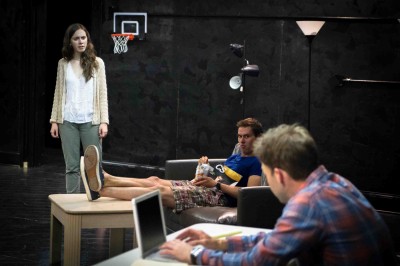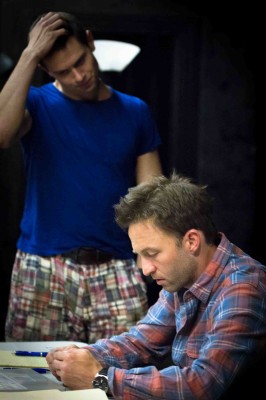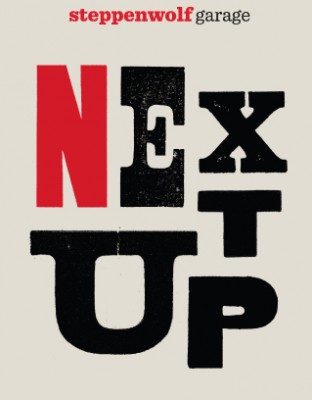Fat Pig
Directed by David Prete
Produced by Steppenwolf Theatre Company
Playing at Steppenwolf Garage
A highly provocative black comedy treated with subtlety and care.
Steppenwolf’s third annual Next Up, featuring the work of Chicago’s up-and-coming generation of theater artists, continues with a mounting of playwright Neil LaBute’s 2005 black comedy Fat Pig. And under the direction of David Prete, this subtle ‘comedy of manners,’ currently playing at the Steppenwolf Garage, successfully showcases LaBute’s characteristic ambiguities in charting the moral lapses of the prototypical American male.
But unlike, for instance, the feckless degenerate Chad of LaBute’s In the Company of Men, who consciously chooses to act with cruel malice, the focus of Fat Pig is rather a guy whose desperate efforts to be good unfortunately result in anything but. LaBute’s protagonist Tom (Josh Bywater), after all, never sets out to deliberately hurt anyone. So when he meets Helen (Anne Joy)—a self-assured, plus-sized young woman—while on his lunch break one day, he’s genuinely drawn to her sense of openness and warm vivacity.
Bonding over a love of gory war films and violent thrillers, Tom is equally struck by Helen’s willingness to poke some fun at her own weight, by her willingness to be vulnerable, and by her refusal to hide. Tom, it would appear, has never been quite as comfortable with himself, and after awkwardly stammering in the face of her unbridled honesty, he finally gets up the gumption to ask Helen out.
 But back at Tom’s office, we start to get a sense of how novel Helen’s openness actually is. Tom’s ‘friend’ and co-worker Carter (JJ Phillips)—with his juvenile energies, sharp-tongue, and pointed distaste for all things vulnerable and weak—is not exactly the kind of guy who’d understand Tom’s admiration for Helen. And when Carter grills Tom to spill the beans on the new girl he’s seeing, Tom responds only with an evasive, “Why do I have to discuss this?” Not that Carter is the only obstacle. Jeannie (Baize Buzan) from accounting—a slender and lovely woman whom Tom has recently slighted—catches wind that there may be a new girl in Tom’s life and responds with caustic vitriol, chastising Tom for all his failings before storming off.
But back at Tom’s office, we start to get a sense of how novel Helen’s openness actually is. Tom’s ‘friend’ and co-worker Carter (JJ Phillips)—with his juvenile energies, sharp-tongue, and pointed distaste for all things vulnerable and weak—is not exactly the kind of guy who’d understand Tom’s admiration for Helen. And when Carter grills Tom to spill the beans on the new girl he’s seeing, Tom responds only with an evasive, “Why do I have to discuss this?” Not that Carter is the only obstacle. Jeannie (Baize Buzan) from accounting—a slender and lovely woman whom Tom has recently slighted—catches wind that there may be a new girl in Tom’s life and responds with caustic vitriol, chastising Tom for all his failings before storming off.
But Tom’s consequent decision to keep his relationship with Helen a secret poses definite problems. For instance, when Carter walks in on the couple having dinner one evening, Tom lies and tells him that Helen’s a Canadian sales representative in town for business. Suddenly aware that Tom is not quite as open as she and sensing his shame over their relationship, Helen implores Tom only to be honest with her. Honestly, unfortunately, is not Tom’s strong suit.
However, Tom’s problem isn’t necessarily that he finds Helen’s weight in and of itself an embarrassment. Tom’s real problem is that he doesn’t like himself. As reflections of his own person, Carter and Jeannie remind Tom of his own moral limitations—his failings, his dishonesty, his shallowness. Hence his efforts to keep Helen all to himself indicate a need to be secretly redeemed, even if it comes at the frequent expense of Helen’s feelings. When the cat is finally out of the bag, for instance, and Carter and Jeannie finally become aware of Helen, Tom defends himself. Turning to Jeannie, he says, “I enjoy her because she’s not you. I like who I am when I’m with her.” A darling sentiment, sure, but one which nonetheless suggests that Tom may not actually like Helen for who she is—only for who she isn’t or how she makes him see himself.
Director David Prete takes a subtle and hands-off approach to the moral dilemma at the center of the play, shifting focus to the  broader social pressures weighing down on it’s characters. Kyle Hamman’s omnipresent video projections, for instance, which sprawl across several television monitors placed conspicuously upstage are replete with inflammatory remarks like ‘fat bitch,’ suggesting the persistent intolerance of our media-infused culture which reduces all of life’s complexities to two flattened dimensions.
broader social pressures weighing down on it’s characters. Kyle Hamman’s omnipresent video projections, for instance, which sprawl across several television monitors placed conspicuously upstage are replete with inflammatory remarks like ‘fat bitch,’ suggesting the persistent intolerance of our media-infused culture which reduces all of life’s complexities to two flattened dimensions.
Still, actress Baize Buzan is serviceable as the cutting Jeannie, though there’s a certain coldness in her disposition and tone that undermines her genuine sense of hurt. If Jeannie comes across as too shrill (as she often does in this production), it opens the way for giving Tom a moral pass on his having abused her so badly, and painting Tom as the ‘good guy’ only feeds into the false image he’s trying to present to us. And while Josh Bywater’s performance more than sufficiently conveys Tom’s almost total lack of self-awareness, what’s missing is that cathartic moment of self-revelation—that moment where Tom finally sees how his efforts to be redeemed in Helen’s eyes have actually turned him into an even greater monster than he was at the play’s start.
 Nevertheless, JJ Phillips gives a charismatic performance as the frat-boy-wannabe Carter, though perhaps he is charismatic to a fault. When explaining to Tom, for example, why society has a natural revulsion for gays, fat people and the elderly (because they remind us of how dangerously close we all are to being uncomfortably vulnerable), there’s a certain menacing spirit missing from the speech. Almost too funny for his own good, Phillips often comes across as more helplessly immature than coldly calculating—which again, comes dangerously close to giving him a kind of ‘moral pass.’
Nevertheless, JJ Phillips gives a charismatic performance as the frat-boy-wannabe Carter, though perhaps he is charismatic to a fault. When explaining to Tom, for example, why society has a natural revulsion for gays, fat people and the elderly (because they remind us of how dangerously close we all are to being uncomfortably vulnerable), there’s a certain menacing spirit missing from the speech. Almost too funny for his own good, Phillips often comes across as more helplessly immature than coldly calculating—which again, comes dangerously close to giving him a kind of ‘moral pass.’
But Anne Joy as the effervescent Helen gives a genuinely lovely performance, sincere in her affectionate giggles while at the same time tragically trusting in her love. And in fact, its Helen’s believable emotional transition from a confident and self-assured woman to an insecure and hurt young girl that really grounds the play in something readily empathic and relatable.
Thus while at first glance Fat Pig appears to be about the mere surface of things, it nonetheless invites more probing self-reflections on the nature of moral choice, honesty, and social pressure. And even if David Prete’s well-paced and shrewdly ambiguous staging at Steppenwolf Garage never gives us clear-cut answers to such problems, at least it manages to ask all the right questions.
RECOMMENDED
Reviewed by Anthony J. Mangini
Reviewed Saturday, June 1st, 2013.
Running time is 1 hour and 40 minutes with no intermission.
Fat Pig runs until June 16th, 2013. Steppenwolf Garage is located at 1624 N. Halsted St.. For tickets call (312) 335-1650 or visit www.steppenwolf.org. Check out their Theater in Chicago listing at https://www.theatreinchicago.com/fat-pig/6334/.

